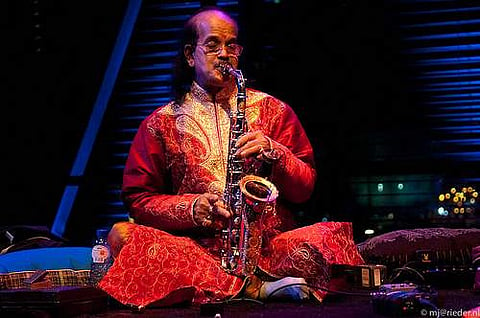

Renowned Saxophonist Kadri Gopalnath passed away following a brief illness at a private hospital in Mysore on Friday. He was 69 and is survived by his wife and music director son Manikanth Kadri. Family sources said that the funeral rites of Gopalnath are expected to be initiated after the eldest son Guru, working in Dubai, returns to the city later on October 11.
Dr Sumanth Swaminathan, a South Indian classical saxophonist trained and tempered by the pioneering legend is a performer, and teacher who is based out of New York City. He met Gopalnath (who he refers to as Kadri Mama) when he was 13 years old. "He had come on a six-week tour of the United States in 1997 accompanied by A Kanyakumari on violin and Guruvayur Dorai on the mridangam. At that point, I had been learning vocal Carnatic music from TN Bala for a few years, and I had been experimenting with Carnatic music on the saxophone with Bala Mama’s guidance," recounts Sumanth in a blog on his website. "In 1997, my parents were heavily involved with a music organization which they co-founded with other Indian classical music lovers in the Philadelphia area. The organization, called SRUTI: The Indian Music and Dance Society of Philadelphia, had sponsored Kadri Mama’s visit, so by my fortune, he and his accompanying artists ended up staying at my parents’ house the day before his concert," he adds.
Born at Mithakere in Sajipamooda village of DK district in 1950, Gopalnath's father Taniyappa was a Nagaswara expert. He learnt to play Carnatic music through saxophone from N Gopalakrishna Iyer. Recipient of the Padma Shri, Kendra Sangeetha Nataka Academy Award, Karnataka Kalasri award among others. At a young age, Gopalnath once saw the saxophone being played in the Mysore Palace band set. Upon hearing the tone of the saxophone, Gopalnath decided to master it. His first concert was held at Chembai Memorial Trust. The 1980 Bombay Jazz Festival was a turning point for Gopalnath. He was an 'A' grade artiste in Akshavani. His concerts were held in different parts of the country as well as at Jazz Festival in Prague, the Berlin Jazz Festival, the International Cervantino Festival in Mexico, the Music Hall Festival in Paris and the BBC Promenade concert in 1994 at London.
During his stay in New York, Sumanth's parents had asked Gopalnath if he would listen to their son playing and if he would give him some pointers. "By the end of his visit, he had agreed to take me as his student in Chennai. By June of 1998, I was on a plane for India, too young to have any strong perspective on what I was doing, but eager to try something new." he writes. "The time that I spent with Kadri Mama has been inspiring. I spent the summers of 1998, 1999 and 2001 under his instruction. Since 2001, Kadri Mama visited the United States every couple of years, so I have travelled to see him, performed with him, and continued to study. In 2012, I spent three months with him touring India, studying, and playing in dozens of concerts," he recounts his interactions with his guru.
There are obvious advantages to learning from a world-class musician, the only of his kind in Carnatic music, says Sumanth. "There are, in fact, only a handful of people around the world who know what it was like to study with him, travel with him and be brought into his family. I would be remiss as a musician if I discussed the life of Gopalnath without talking about some of my personal experiences as his student," says Sumanth.
Kadri Mama, says Sumanth, was a practice minded instructor. He believed in teaching a lot in a short time and sending his students home to practice for several hours, work out the kinks, learn some things on their own, and come back with vastly improved playing. "When I first started studying with him and asked him how much I should be playing per day, he told me that I should be practising close to 6 hours per day outside of class — which anybody who has played a wind instrument knows is not easy," says Sumanth. Recounting his visits to Chennai Sumanth talks about how Gopalnath taught him one Krithi per day and he expected him to play it perfectly by the next class, usually the next day. "It usually took about 45 minutes to 2 hours of class instruction to learn composition and 1-3 hours of practice at home to play it well," he says.
"In each of my first two summers, I went on a two-week tour with Mama when he was called for concerts in Karnataka. These trips still stand out the most in my memories of studying with him. We would travel by trains and buses overnight and when we did stay in hotels he would wake me up early in the morning, put a towel in the bell of my saxophone to dull the sound, and ask me to start practising. When we stayed at his house in Mangalore, he would often teach me 3 times a day and send me upstairs to practice. It was like a music boot camp," he further adds.
Read Dr Sumanth's entire blog post here
